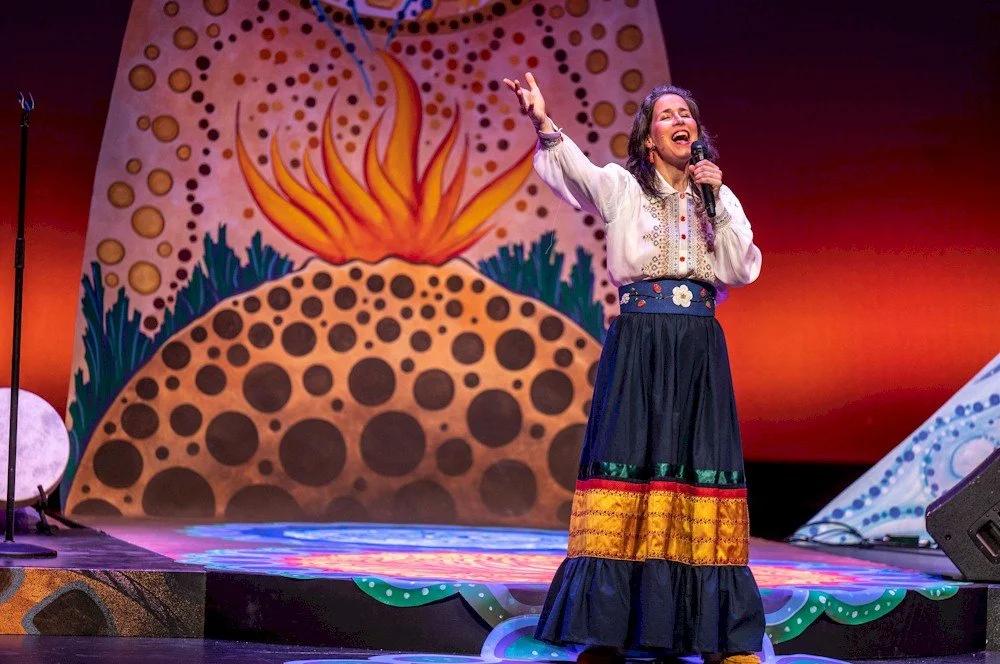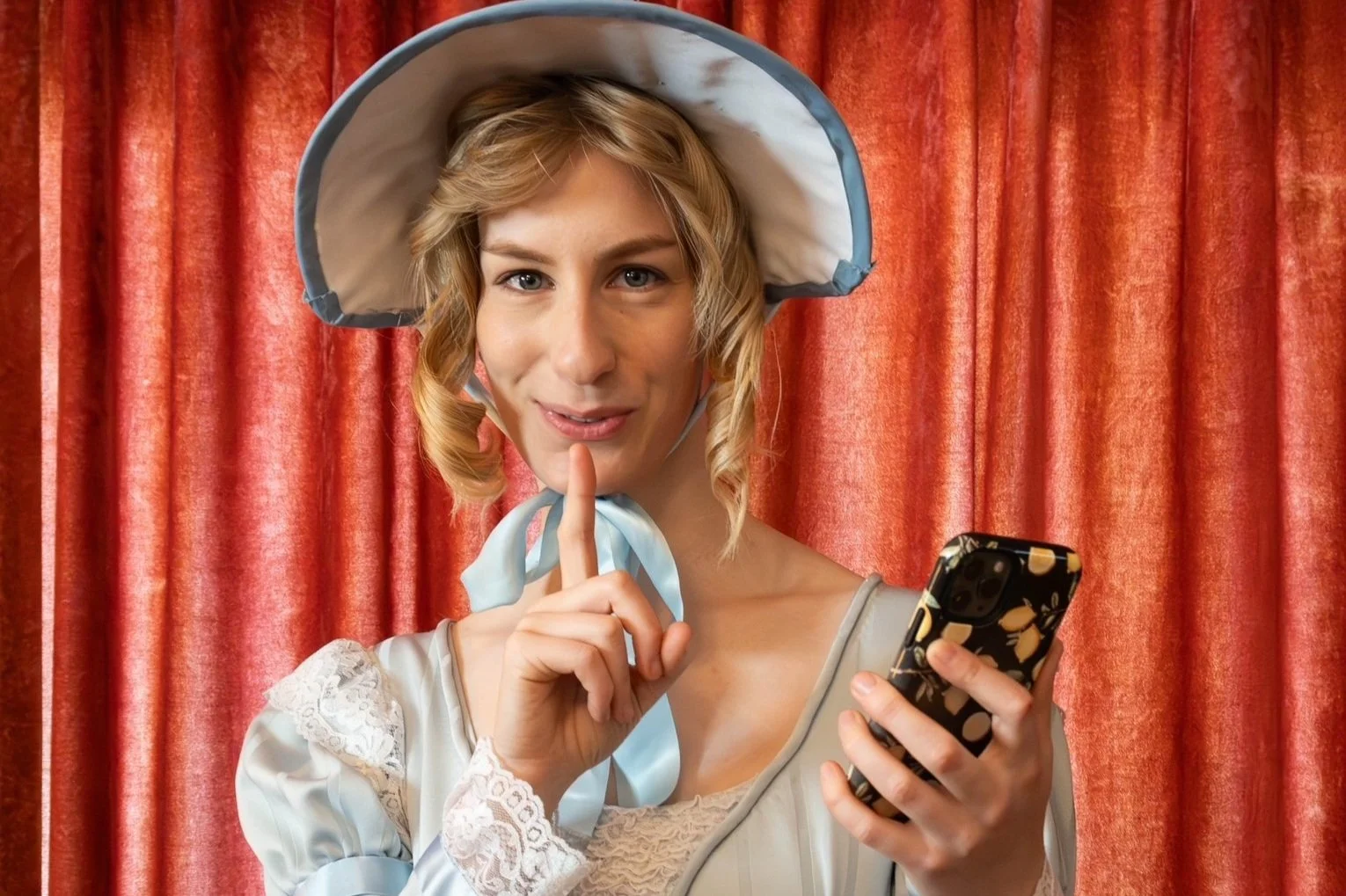Métis artist Andrea Menard sings and tells stories of reconciliation in Rubaboo
Drawing on the four sacred elements, the cabaret also features live music
Andrea Menard, Rubaboo. Photo by Dahlia Katz for the Grand Theatre
The Arts Club Theatre Company and Grand Theatre present Rubaboo to April 30 at the Granville Island Stage
WHEN THE OPPORTUNITY arose for Métis singer-songwriter-actor Andrea Menard to create a post-pandemic piece to be coproduced by The Arts Club Theatre and London, Ontario’s Grand Theatre, she took some time to think about it in a quiet place she refers to as a receiving space. There, she connects with her grandmothers—familial and spiritual—who guide her in her life.
“I have a deep connection and communication with my helpers from the other side,” Menard shares in a phone interview with Stir. “My grandmothers are my spirit helpers. You can talk about it as muse; writers tend to clue into something being given to them. Well, my grandmothers are very bossy and loud. Ideas started coming. I get what I’m needing. It surprises me as much as anyone.”
The concepts she captured from those soulful encounters gave rise to Rubaboo, an Indigenous musical cabaret now having its world premiere. Written and performed by Menard—who is also a wellness trainer/educator and retreat host—the show takes its name from a Michif word meaning “leftover stew” or “big pot”. Through a blend of song, dance, storytelling, and live music (with composing credits shared by Menard and long-time collaborator Robert Walsh), she shares her love for Métis people and culture—but that’s not all.
“When Dennis Garnhum from Grand Theatre first called me to ask if I had anything, I said ‘I don’t want to be on any stages right now if I’m not furthering reconciliation and if I’m not furthering Canadians’ learning about our real history and falling in love with Indigenous people,” Menard says. “I don’t want to be on-stage as anyone’s token. I want to be of service.
“I’ve always been on a journey of self-evolution,” she explains. “I know that I’m here to become a better person so I leave the world a better place than when I came into it….I’ve been taught that we have a responsibility to each other and to the planet. But in western culture, western beliefs, it’s all about self—me, me, me, me, me. It’s a sickness on the planet in many ways. It’s backwards. In my way, I thought, ‘How can I contribute? If I’m meant to be a performer and performing is my vehicle, how can I be of service? If I’m going to be in this world, then I need to show up differently and I want to send a different message, especially as an Indigenous woman who’s getting mainstage platforms, because for many, many, many years we weren’t given access to these platforms.”
Menard, who appears in the just-released TV series Sullivan’s Crossing, is a five-time Gemini-nominated actress and a 15-time music award winner who has released four albums, a symphony show, two television programs, and a TEDx Talk called “Silent No More”. Born in Manitoba and based in Vancouver, she carries the name Skooteah Equahh, which means “Fire Woman” in Anishinaabe, and the Cree name Notigwew Yutin, which means “Grandmother Wind”.
In Rubaboo, some of the songs are written and performed in different dialects of the Métis language of Michif—French, Cree, and Heritage among them. (After travelling across the Métis homeland to work with various Elders and Language Keepers, Menard released an album called Anskoonamakew lii Shansoon, or Giveaway Songs, last November featuring tracks that appear in the show.) She tells stories about unity and resilience. She also addresses colonization, residential schools, and violence against women—“but in a container of love”, she says.
“There are warriors in our communities and peacemakers in our communities, and we need both,” she says. “I’m probably more of a peacemaker because I need peace in my own body. I need people to know and understand and not be blind to the history of the world of Indigenous people and what is actually going on behind the scenes….I’m going to do this with a loving hand, but you have to wake up. One of my audience members in London said ‘I don’t think I’ve ever been smacked in such a gentle way before.’”
Directed by Alanis King, Rubaboo draws on the four sacred elements: earth, water, air, and fire. These elements are also featured in Cimmeron Meyer’s set design, which includes backdrops that rise up to the ceiling based on Métis artist Leah Dorian’s paintings for the deck of spirit cards that Menard created and just released. Joining Menard on-stage are Walsh on guitar, stick player Nathan Aswell, and Cree fiddler Karen Shepherd.
“It’s not a play,” Menard says. “The best way we can describe it is a cabaret, because I’m bringing all of who I am: the singer, storyteller, the one who’s the advocate, the teacher, the one who goes to ceremony… All of those things are in this little show. The container is a rubaboo, but the container is really the four sacred elements holding this whole shape together because a rubbaboo can’t be made without the four sacred elements. It’s a combination of all the things I am right now, and if I wanted to be of service, I feel it feels like a perfect contribution for that.”














